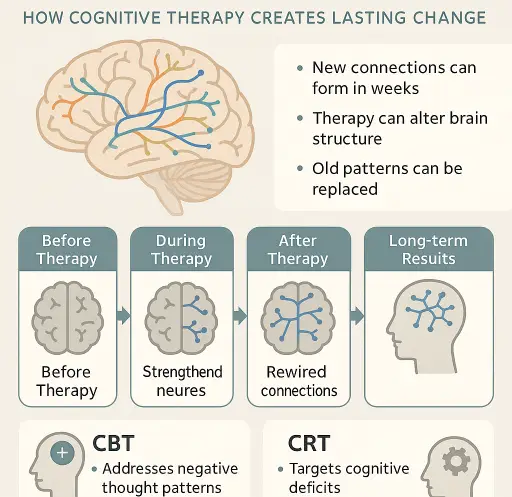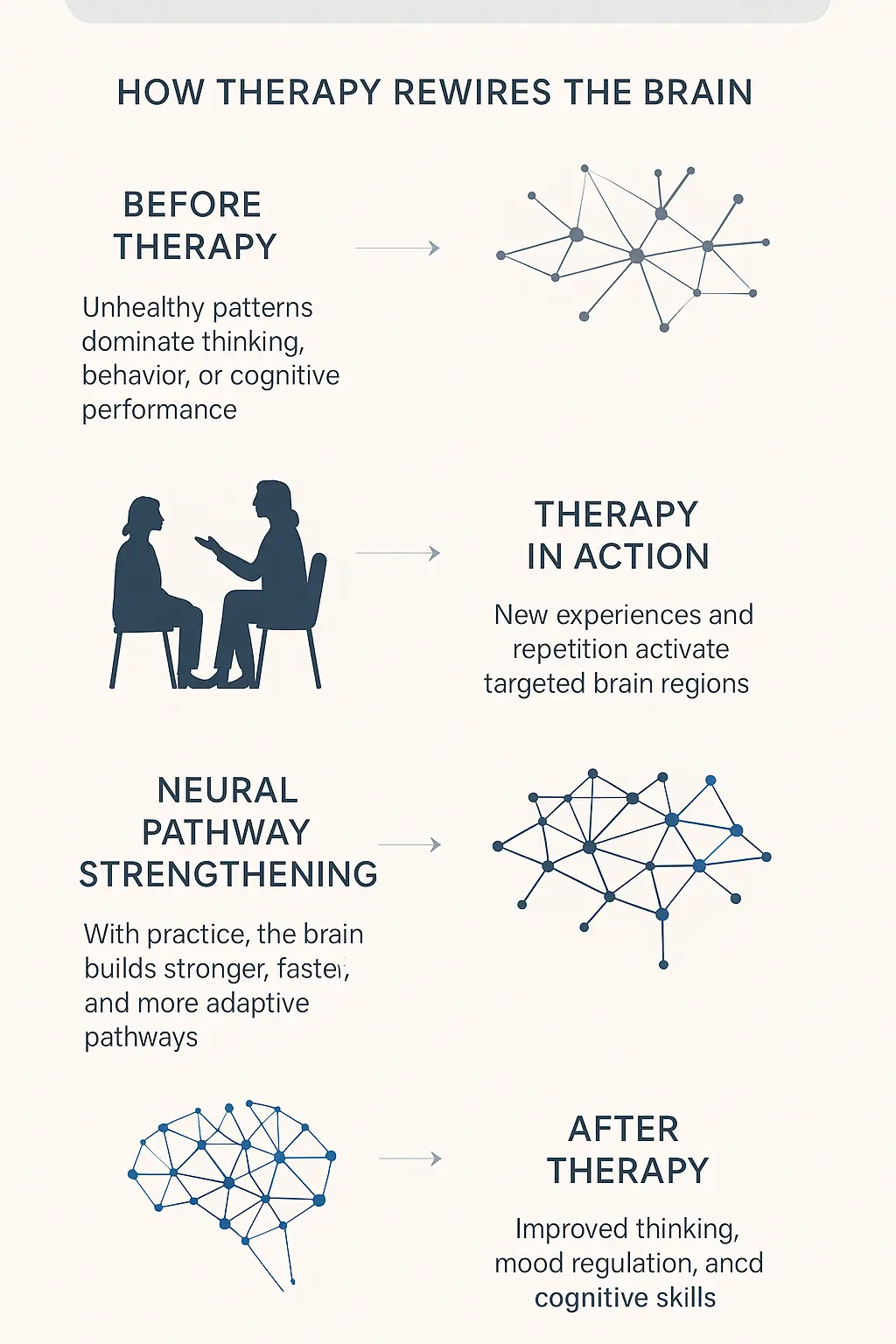
CBT vs. CRT: How Cognitive Therapies Improve Thinking, Mood, and Brain Function
Cognitive health is essential for daily life, especially in a fast-paced city like New York. Whether you’re dealing with anxiety, memory problems, ADHD, or brain fog after COVID-19, proven cognitive therapies can help. Two of the most effective approaches are Cognitive Behavioral Therapy (CBT) and Cognitive Remediation Therapy (CRT). Both play a vital role in improving thinking, mood, and brain function, but they work in different ways. Understanding the differences between Cognitive Behavioral Therapy in Midtown, NYC, and Cognitive Remediation Therapy in New York City can help you choose the right path to better mental and cognitive health.
What Is Cognitive Behavioral Therapy (CBT)?
Cognitive Behavioral Therapy, or CBT, is one of the most widely used and researched forms of CBT In Midtown NYC, CBT is designed to be practical and structured. Individuals work with a clinical psychologist to learn coping skills, challenge negative thinking patterns, and gradually confront situations that may have previously felt overwhelming. For many, CBT leads to lasting improvements in emotional resilience and daily functioning.
What Is Cognitive Remediation Therapy (CRT)?
Cognitive Remediation Therapy (CRT) focuses on improving the brain’s cognitive functioning through targeted exercises. Unlike CBT, which addresses emotions and behavior, CRT focuses on strengthening areas such as memory, attention, and executive functioning. This approach is grounded in the science of neuroplasticity, the brain’s remarkable ability to adapt and reorganize.
Our team offers Cognitive Remediation Therapy in New York City to support individuals facing cognitive challenges that impact their work, school, or daily life. CRT is especially beneficial for:
Chemobrain following cancer treatment
Cognitive Remediation Therapy uses structured, evidence-based exercises, often delivered by a neuropsychologist, to target specific cognitive skills. These interventions complement therapies like CBT by improving the brain’s ability to focus, process information, and retain memory — essential for managing both cognitive and emotional symptoms.
A Collaborative Team of Specialists
At the heart of effective care is a team-based approach. The practice brings together experienced clinical psychologists, neuropsychologists, and psychiatrists who collaborate to address both cognitive and emotional health.
Clinical psychologists focus on providing therapies such as Cognitive Behavioral Therapy in Midtown NYC, helping individuals develop tools for managing anxiety, depression, and other emotional concerns. Neuropsychologists play a vital role in assessing cognitive functioning and leading interventions, such as Cognitive Remediation Therapy in New York City, which targets memory, attention, and processing skills. Together, this integrated team ensures that treatment is tailored to each individual’s unique needs, offering comprehensive support for cognitive and emotional well-being.
The Science of Neuroplasticity and Cognitive Therapies
Both CBT and Cognitive Remediation Therapy in New York City are supported by the science of neuroplasticity, the brain’s ability to form new neural connections and adapt throughout life. Through cognitive exercises, skill-building, and structured therapy, the brain can strengthen areas that may have been impacted by anxiety, ADHD, MCI, chemobrain, or brain fog from Long COVID.
By working with a clinical psychologist or neuropsychologist, individuals can leverage neuroplasticity to enhance cognitive performance and improve emotional resilience. Whether through Cognitive Behavioral Therapy in Midtown NYC or Cognitive Remediation Therapy in New York City, the goal is to create lasting, meaningful changes in brain function and overall quality of life.
CBT vs. CRT: Key Differences at a Glance
| Feature | CBT: Cognitive Behavioral Therapy | CRT: Cognitive Remediation Therapy |
|---|---|---|
| Focus | Thoughts, emotions, behaviors | Cognitive functioning (memory, attention, processing) |
| Goal | Reduce emotional distress, build coping skills | Improve cognitive skills through neuroplasticity |
| Method | Talk therapy, practical exercises | Computer tasks, structured cognitive exercises |
| Common Uses | Anxiety, depression, stress, insomnia | ADHD, MCI, Chemobrain, Brain Fog, Long COVID |
| Practitioner | Clinical Psychologist, Therapist | Neuropsychologist, Cognitive Specialist |
Finding the Right Cognitive Support in New York City
Cognitive therapies are not one-size-fits-all. Many individuals benefit from a combined approach, utilizing both Cognitive Behavioral Therapy in Midtown, NYC, and Cognitive Remediation Therapy in New York City to address emotional and cognitive challenges simultaneously.
For those struggling with anxiety that clouds focus, lingering brain fog after COVID, or cognitive difficulties due to MCI, ADHD, or chemobrain, the right intervention can make a significant difference. With the support of a clinical psychologist, neuropsychologist, and psychiatrist, a personalized treatment plan can help improve cognitive functioning and emotional well-being.
Strengthening the Mind Through Cognitive Therapies
The human brain has a powerful capacity for change, thanks to neuroplasticity. Through approaches such as CBT and Cognitive Remediation Therapy in New York City, individuals can build resilience, sharpen their thinking, and regain clarity.
For those seeking expert care in Cognitive Behavioral Therapy, specialized Cognitive Remediation Therapy, or a comprehensive evaluation with a clinical psychologist or neuropsychologist, an experienced team is available to guide the way.


